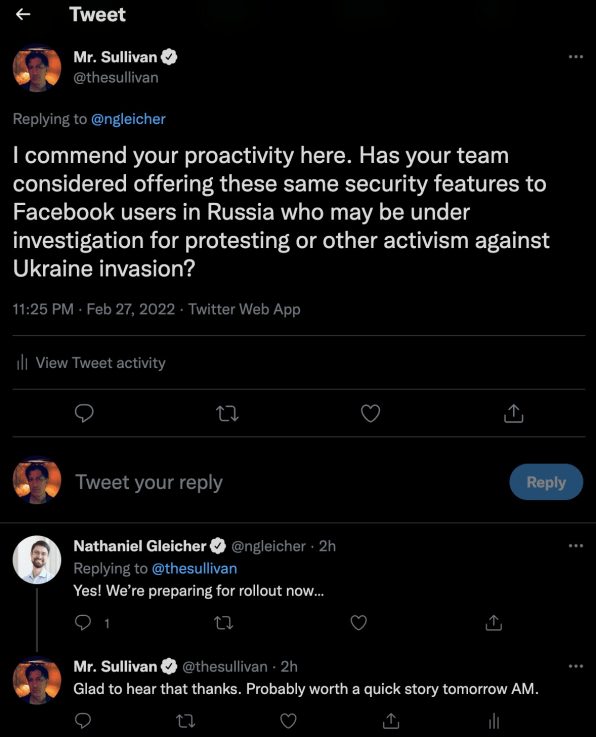- | 8:01 am
Meta will expand ‘lock your profile’ protections to Russian Facebook users

Over the weekend, Meta said it was giving Facebook users in Ukraine special tools to lock their profiles and make their friends’ lists unsearchable. Meta fears that the Russian military or its supporters could target Ukrainians via their social media accounts.
The Russian military, after all, could use social media accounts to target Russians who have criticized the Russian invasion in Ukraine, or who have taken to the streets to protest it. The risk of this could grow if the invasion and occupation drag on and its popularity continues falling within Russia. In Russia, people who protest against the government face serious risks, including penalties, jail, and loss of employment.

[Screenshot via Twitter]
Meta’s “Lock Your Profile” tool gives Facebook users a way to lock their profile in one step, the company explains in a blog post. When a user’s profile is locked, “people who aren’t their friends can’t download, enlarge, or share their profile photo, nor can they see posts or other photos on someone’s profile, regardless of when they may have posted it.”
Meta says it’s also provided new security tools for Messenger users in Ukraine, “such as by quickly rolling out notifications for screenshots of disappearing messages in our end-to-end encrypted chats,” the company says.
FIGHTING PROPAGANDA
Both Meta and YouTube have taken steps in recent days to limit the use of their platform to spread disinformation and propaganda in Ukraine.
Meta said it would ban paid ads from Russian state-controlled media outlets such as RT and Sputnik. Such outlets will also no longer be able to profit from high numbers of views to their pages or content on the platforms.
“We have been in contact with the government of Ukraine,” Meta says in its Ukraine blog post. “At their request, we have restricted access to several accounts in Ukraine, including those belonging to some Russian state media organizations. We are also reviewing other government requests to restrict Russian state controlled media.”
On Saturday, Google-owned YouTube told NPR’s Shannon Bond that it would prevent Russian-controlled media channels from monetizing video views. YouTube also says it is blocking RT and Sputnik videos from being viewed in Ukraine.
The announcements from Google and Meta came just before the European Union said it will block the television broadcasts of RT and Sputnik within EU countries.
SOCIAL NETWORKS TREADING LIGHTLY
Information warfare has become an increasingly important aspect of modern war, in part because of the vast reach and influence of social networks such as Facebook, Twitter, and YouTube. With public opinion of these platforms already low, and interest in regulating them at an all-time high, they’re naturally interested in limiting their influence on the conflict in Ukraine.
Meta said Sunday it’s already taken down at least one coordinated disinformation network targeting users in Ukraine. The company says it discovered a network of people based in both Russia and Ukraine who were running pages that posed as independent news entities. The same people were also found to be creating fake personas across other social media platforms, including Twitter, YouTube, Telegram, Odnoklassniki, and VK, Meta said.

































